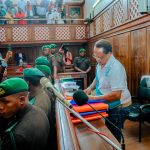
Twitter was accessible in Nigeria on Thursday after the government lifted a seven-month ban on the social media giant for deleting a tweet by President Muhammadu Buhari.

Nigeria halted Twitter operations in June, provoking an international outcry over freedom of expression. The government and Twitter had been in negotiations over restoring the service based on a set of conditions, including Twitter registering its operations in Nigeria.
Twitter was accessible in the main metropolis and economic hub of Lagos as of 0600 GMT, an AFP journalist said.
“We are pleased that Twitter has been restored for everyone in Nigeria. Our mission in Nigeria and everywhere in the world is to serve the public conversation,” a Twitter spokesperson told AFP.
“We are deeply committed to Nigeria, where Twitter is used by people for commerce, cultural engagement, and civic participation.”
In Africa’s largest economy, three quarters of the population of 200 million are younger than 24, a generation that is also hyper-connected to social media.
The ban shocked many in Nigeria, where Twitter has had a major role in political discourse, with the hashtags #BringBackOurGirls after Boko Haram kidnapped nearly 300 schoolgirls in 2014.
Young activists turned to Twitter last year to organise the #EndSARS protests against police brutality that eventually grew into the largest demonstrations in Nigeria’s modern history before they were repressed.
National Information Technology Development Agency (NITDA) director general Kashifu Inuwa Abdullahi, who had been part of the negotiations, said on Wednesday Buhari had approved the lifting of the ban from midnight. He said the social media giant had agreed to regulations to restore service, included establishing a legal entity in Nigeria, appointing a country representative and complying with tax obligations.
Elections and lawsuits
The United States, European Union and Canada were among those who joined rights groups in condemning the ban as damaging to freedom of expression in Africa’s most populous country.
Many Nigerians immediately took to Twitter to celebrate the platform’s return, including the country’s presidential spokesman who tweeted “Welcome back”. But others criticised the ban’s curtailing of basic rights and pointed out the Twitter had returned as Nigeria’s political space heats up before the 2023 presidential election.
“Lifting the ban will not make Nigeria’s forget Buhari’s intolerance of democratic freedoms,” the civil rights group Concerned Nigerians said in a Twitter message.
The court of the regional bloc Economic Community of West African States or ECOWAS is also due to make a ruling on January 20 on four lawsuits brought by rights groups and lawyers challenging the Twitter ban.
“The Twitter ban was illegal in the first place, and an attack on freedom of expression, including online, access to information and media freedom,” Amnesty International said on its Twitter account.
Nigerian officials had criticised Twitter for deleting Buhari’s comment while accusing the platform of allowing activities that threatened the country’s existence. That was a reference to social media remarks by separatist agitators from the country’s southeast, where a civil war five decades ago killed one million people.
“The immediate and remote cause of the suspension was the unceasing use of the platform by some unscrupulous elements for subversive purposes and criminal activities, propagating fake news, and polarising Nigerians,” Abdullahi said.
Twitter deleted the comment for violating its policies when Buhari had referenced Nigeria’s civil war, in the context of a warning to those responsible for recent unrest in the country’s southeast.
After the ban, officials also referenced then Twitter CEO Jack Dorsey’s support for the #EndSARS protests last year in Nigeria against police brutality.
About 40 million people or around 20 percent of Nigeria’s population have a Twitter account, according to local researchers, and many used the platform for business.






